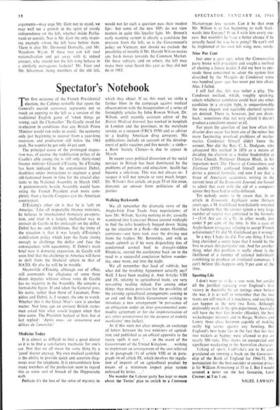Nine Per Cent Just over a year ago, when the
Conservative party broke with precedent and sought a method of electing a future leader, I did my best to per- suade those concerned to adopt the system first described by the Marquis de Condorcet some two hundred years ago. but never put into effect. Alas, I failed.
I still feel that this was rather a pity. The Condorcet method, which, roughly speaking, selects whichever candidate could beat any other candidate in a straight tight, is unquestionably the most elegant and equitable electoral system yet devised. There is, however, just one draw- back: sometimes (but not very often) it doesn't produce a consistent answer at all.
For years the question of just how often this disaster does occur has been one of the minor but more fascinating unsolved problems of mathe- matics. Condorcet himself didn't know the answer. Nor did the Rev. C. L. Dodgson, who advocated this method in 1876 as a means of deciding the election to a Senior Studentship at Christ Church. Professor Duncan Black, in his important work The Theory of Committees and Elections (1958), confessed himself unable to derive a general formula; and now I see that a brace of American academics, writing in the current issue of the Economic Journal, are forced to admit that even with the aid of a computer apiece they have had to retire defeated.
Yet nobody seems to be aware that, in an article in Economic Appliquee some thirteen years ago, a M. Guilebaud nonchalantly revealed in a footnote that the answer (given a very large number of voters) was contained in the formula 1—(3/e) Arc cos (1 / v 3): in other words, just under 9 per cent of the time. Is this a case of Anglo-Saxon arrogance refusing to accept French achievement? Or did M. Guilebaud get it wrong?
In a way I hope he did. For one thing, I have long cherished a secret hope that I would be the first to crack this particular nut. And for another thing, what this problem is really about is the likelihood of a number of rational individuals combining to produce an irrational consensus. I can't believe this happens only 9 per cent of the time.


































 Previous page
Previous page